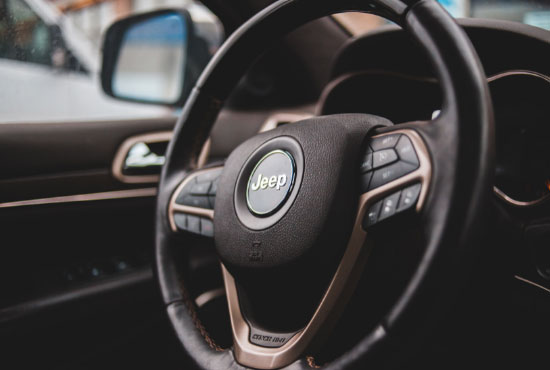Your steering wheel is the control center of your vehicle. Being able to navigate the roadways requires you to have a steering wheel and when your steering wheel locks up or becomes extremely difficult to turn it is a scary situation.
This can be caused by many different things including a car ignition lockup.
Reasons Why A Jeep Wrangler Steering Locks Up

The best way to approach this concern is to look at the possible reasons why this could occur. It is highly advisable for anyone who is experiencing steering issues to visit their mechanic and find out the cause as quickly as possible.
Ignition Lockup
One of the causes of a steering wheel locking up is the ignition system can fail and stop allowing the car key to turn the vehicle on or off. If this failure happens while you are driving then the steering wheel locks up and does not allow you to control the vehicle.
Many vehicles have steering wheels that are designed to lock into one position when the engine is shut off. This is a safety feature that helps stops thieves from being able to steal your vehicle.
Inside the steering columns of vehicles that have this feature, there is a metal sleeve with a lock pin. If the lock pins work themselves loose it can get out of place and jam up against the metal sleeve. This effectively blocks the steering from being able to move, or at the very least it makes it very difficult to operate the steering wheel.
Other Signs That The Steering Locking Mechanism is Failing
Before the wheel totally locks into a position many Jeep owners have reported experiencing the following issues.
- They had to use excessive force to be able to turn their steering wheel either left or right
- When they were turning their steering wheel back to a central alignment, they heard loud popping sounds
- When they turned the steering wheel they heard loud clicking noises
What to do:
Your only course of action when this occurs is to take the steering system apart and place the lock pin back into position. You should also investigate why the lock pin worked loose because this is a rare occurrence.
Power Steering System Failure
The power steering in the vehicle is designed to use a power steering pump to make the steering components easier to turn and maneuver. If the power steering pump starts to fail then the pressure that it keeps on the steering components is changed. That change in pressure creates steering complications for the driver.
A failing power steering pump may not actually cause the steering wheel to seize and be unmovable, but it will definitely make it extremely hard to turn the steering wheel.
Other signs that the power steering pump may be failing include:
- When you are turning your wheel you may notice a whining noise
- Your car may take longer to respond to your turns of the steering wheel
- The steering wheel may have been feeling stiffer than normal
- You might have to forcibly yank the steering wheel in one direction to make the unit work
What to do:
If this happens to you, or you suspect the power steering is failing you need to see a mechanic as soon as possible. Do not continue to drive this vehicle until the issue has been resolved because it is dangerous to do so.
Low Levels of Power Steering Fluid
Your power steering could not be working properly because you do not have the proper levels of power steering fluid in the vehicle. If you start to notice any difficulty operating the power steering in your vehicle or you start to think the steering wheel is suddenly stiffer than normal it would pay for you to check your power steering fluid level.
If you drive a vehicle with low levels of power steering fluid for very long you will cause the power steering pump to fail.
If your power steering fluid is low you may notice:
- The steering feels jumpy or likes it jerks
- You may hear noises like whining or popping when you steer
- You may see a puddle of fluid under the vehicle after it has been parked for short period of time
- Your steering wheel may be increasingly hard to maneuver
What to do:
You should regularly check your power steering fluid levels. If the fluid is low you should add enough fluid to bring the level back up to the acceptable norms.
You should then try to find the source of the fluid leak. Power steering fluid levels should remain the same without going down so any need to add fluid indicates a leak.
Every 60,000 miles you should drain the power steering fluid and replace it with fresh fluid.
Steering Linkage fails
It is very rare for a steering linkage to fail suddenly. It can happen though.
When the steering linkage breaks you will not have complete control of the vehicle but you should have enough control to steer the vehicle to a safe place to park on the side of the road.
Before the linkage breaks, you will normally have other signs that something is going wrong. These include, but are not limited to:
- The steering wheel will have unusual amounts of play in it
- The vehicle may be pulling to one side or the other
- loud clunking noises may happen when you execute a turn
What to do:
If the linkage breaks you will have to have the automobile towed to a place where it can be repaired or replaced.
More Jeep-Related Articles
1. Clicking Noise When Turning in 4 Wheel Drive
2. Jeep Wrangler Steering Wheel Jerks When Turning
3. How Much Does It Cost to Add Lockers to a Jeep?
Frequently Asked Questions
Does Power Steering Pump Failure Cause Your Steering Wheel To Lock Up Stiffly?
Power steering pump failure can cause the steering wheel to be difficult to turn and when you are making a turn it can feel like it is locked up.
Can You Drive If Your Power Steering Fails?
You can drive a vehicle that is experiencing power steering failure, but it will be difficult to operate the steering wheel and you need to slow down so you have more time to make steering corrections.
Can Driving Around Sharp Turns Often Cause Your Steering System To Fail?
Driving aggressively like you have to do to take sharp turns for long periods of time can place stress on the steering system that causes the system to experience fatigue failure.
Final Thoughts
Steering problems like a steering wheel that locks up are serious and should be addressed sooner rather than later. If you hear any strange noises when you are turning the wheel, or the wheel starts to turn easier or becomes harder to turn investigate the possible causes right away. It is much better to waste a little time investigating than to face the possibility of losing control while driving.

